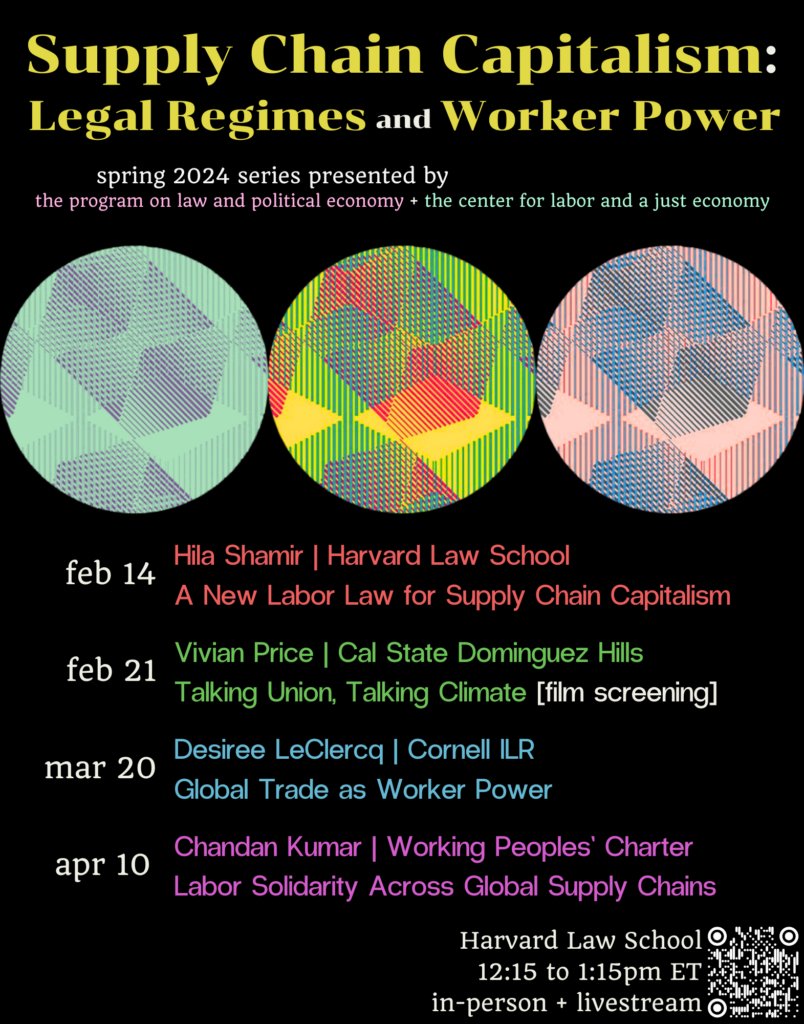Spring 2024 Event Series
February 14, February 21, March 20, April 10
Wasserstein Hall, Harvard Law School
12:15 to 1:15 pm Eastern
In-person and livestream
The Program on Law and Political Economy and the Center for Labor and a Just Economy are excited to present the semester-long series, Supply Chain Capitalism: Legal Regimes and Worker Power. The series will examine law’s role in structuring global supply chains. Across four installments, we will discuss how contemporary modes of supply, production, and capital ownership – or Supply Chain Capitalism – impact the distribution of power and resources between the global north and the global south and between capital and labor. We will pay particular attention to law’s role in enabling, sustaining, or potentially disrupting these distributive and relational patterns.
All are welcome! For those who plan to join via the livestream, Zoom links will be available on this page at least 24 hours before each session. Please see further event details below.

Schedule
Wednesday, February 14 at 12:15pm ET | Wasserstein Hall, Room 3016
A New Labor Law for Supply Chain Capitalism
Hila Shamir, Harvard Law School
Labor law gradually protects fewer of the world’s workers. Changes in work and capital structure, new technologies and evolving modes of supply and production (together, ‘supply chain capitalism’), lead to an incongruence between the distribution of market power and the premises and tools of labor law, creating barriers to workers’ organization and agency. This incongruence stems from the fact that labor law developed in industrial economies to respond to the power disparities between capital and labor, and is therefore tied to a dyadic employer-employee paradigm in which labor law seeks to empower workers vis-à-vis employers, the presumed owners of capital. Yet this is no longer the case in the era of supply chain capitalism, where the direct employer is often a supplier in a Global Value Chain (GVC), whose economic calculus is dependent on corporations in higher tiers of the chain. Given the crises of both labor law and GVC governance, the talk will chart a trajectory to restructure labor law and labor institutions to counter the power structures of supply chain capitalism.
Wednesday, February 21 at 12:15pm ET | Wasserstein Hall, Room 3016
Talking Union, Talking Climate [film screening and discussion]
Vivian Price (dir.), California State University Dominguez Hills
Talking Union, Talking Climate is a conversation between oil workers from California, Norway, and Nigeria about their jobs, their labor conditions, and thoughts on the impact of climate change on their industry. We often hear statistics and predictions on jobs and climate change from policymakers and companies who are preparing for a green shift, but how do workers make sense of their future? The 15-minute film offers viewers a down-to-earth, funny, and serious opportunity to understand the experiences of workers in the global north and global south as they compare notes and learn about each other’s situations. This short video will stimulate workers, students, environmentalists, and the public to rethink their own ideas about the fossil fuel industry, the green shift, and what a just transition might entail.
Wednesday, March 20 at 12:15pm ET | Wasserstein Hall, Room 3016
Global Trade as Worker Power
Desiree LeClercq, Cornell University School of Industrial and Labor Relations
Global trade policy is profoundly mistaken for neoliberalism. Decades of multilateral and bilateral trade demonstrate how state-led trade negotiations and enforcement focused solely on market liberalization drown out the voices of vulnerable communities, to the detriment of the working class and the equitable distribution of trade gains. This talk will offer a counter-vision of global trade in which negotiations and enforcement create a platform for workers to assert their voices and build their power. The Biden administration’s “worker-centered” trade policy moves the needle towards a new global trade framework capable of building such power, but the remnants of prior policies loom large and thus undermine the potential emancipation from neoliberalism.
Wednesday, April 10 at 12:15pm ET | Wasserstein Hall, Room 3007
Organizing and Challenges of Trade Unionism in Global Value Chains
Chandan Kumar, Working Peoples’ Charter
The growing informality of the labor market has become a ‘blessing in disguise’ for a large number of companies, especially major corporations. As the world of work changes, so too do organizing efforts. It is imperative that trade unionism adapt to the changing nomenclature of the new world of work. The trade union movement has already been experiencing the difficulties of organizing in the post-liberalization era, but newer phenomena – global supply and value chains, platform economies, etc. – are more complex to comprehend. This talk argues that the workers’ movement must develop its capacity to utilize opportunities arising from the world of technology. Social media has become a major collectivizing agent in many circumstances of the recent labor movement. Such tools of social media should be strategically used to collectivizing and unionizing workers of the emerging sector of the knowledge economy. The trade union movement must think through how a new generation of organizers can harness traditional organizing methodologies such as tripartitism, social dialogue, etc. alongside new communication tools.
Presenters

Chandan Kumar is a labor rights activist based in Pune, India. He is the organising secretary for the Working Peoples’ Charter (WPC), an organizing, research, and advocacy network focused on the informal labor sector in more than thirteen Indian states. WPC members organizations include trade unions, NGOs, lawyers, academics, activists, and researchers.

Desiree LeClercq is the Proskauer Employment and Labor Law Assistant Professor at Cornell University’s School of Industrial and Labor Relations in Ithaca, New York, where she teaches international labor law, U.S. labor law, and employment law. Her work explores the incoherence between international labor law, U.S. trade law, and constitutional law, as well as incoherence between international organizations. Her research places marginalized workers at the center of global and economic policies.

Vivian Price is a labor scholar and documentarian. She is currently a Professor at California State University, Dominguez Hills, where she served as coordinator of Labor Studies for many years and, inspired by students, founded the Labor, Social and Environmental Justice Fair. Her films and publications focus on gender and labor in construction and agriculture and now on climate change. She has directed three feature films – Hammering It Out (2000), Transnational Tradeswomen (2006), and Harvest of Loneliness (2010) – as well as many shorter projects.

Hila Shamir is a Professor at Tel-Aviv University Faculty of Law and a Visiting Professor at Harvard Law School. She is an expert in the fields of Employment, Labor, Immigration, and Welfare Law with a focus on issues of workers in global value chains, human trafficking, and gender equality. Recently, she received a major European Research Council (ERC) grant to pursue research on A New Labor Law for Supply Chain Capitalism (Sept 2024 – Sept 2029).

